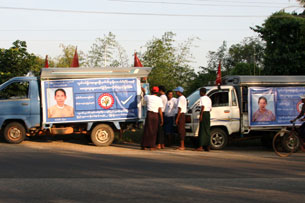




Former U.S. First Lady Laura Bush wants the world to speak up on Burma and the various restrictions imposed on its people by the ruling military junta, which is holding elections this weekend that are being criticized as not free and fair.
She made the call as U.S. and key European embassies in Burma, among other foreign missions, refused to participate in "government-sponsored tours" of election activities on Nov. 7.
The junta has refused to allow full monitoring of elections by foreign observers. Foreign journalists have also been barred from covering the first polls in the country in 20 years.
Bush accused the junta of wanting to legitimize its military rule through the secretive elections.
"I think what the world can do is speak out and speak straight to the people of Burma in any way that is possible," Bush said in an interview with RFA, which broadcasts news and information in Burmese into that country as its people have no access to free news media.
"I want the people of Burma to know that the government of Burma is not allowing election monitors from around the world to come to make sure it is a free and fair vote," said Bush, who has been a longstanding campaigner for political and other reforms in the Southeast Asian state.
"Many, many people in the world ... are watching and thinking of the people of Burma," she said ahead of the polls, which have been criticized as a sham by key powers such as the United States and Britain as well as rights groups.
There is little or no chance of any of the opposition parties winning the elections as they are contesting fewer seats compared to those vied by the junta's proxy parties. Furthermore, 25 percent of seats are reserved for military officers under a constitution passed by a referendum in 2008.
Under such a scenario, the junta's key proxy, the Union Solidarity and Development Party (USDP), is widely expected to win.
Unfair regulations

Bush sent a personal message to Suu Kyi in the RFA interview.
"I want her to know that she has so many admirers around the world. People who admire her beautiful and peaceful nature and also her courage to continue to advocate for all of the people in Burma, for all of the ethnic minorities and for everyone in the country," Bush said.
Meanwhile, the United States and the European Union (EU) have turned down an offer by the junta to take diplomats on a guided tour of election activities on Sunday.
"Authorities arranged for a government-sponsored election tour for Rangon-based diplomats. The U.S. embassy in Rangoon will not participate in tightly controlled government-sponsored tours of election activities which are not a substitute for genuine election observations," a State Department official said.
Embassies of key European nations have also rejected the offer made by the junta-appointed Election Commission.
"Their offer to embassies based here to join an 'electoral explanatory mission' contained terms which were always going to be difficult for E.U. missions resident here (there are four of us – the UK, Germany, Italy, and France)," said British envoy in Rangoon Andrew Heyn.
"The original offer made to us, via an official diplomatic third person, suggested hand-picked venues and official minders who might insist on determining to whom we could and could not speak," he said in a blog posted in the Guardian newspaper.
"The E.U. could not accept these terms. Official E.U. electoral observation has a certain brand, a respectability gained over many years and many elections. And it needs to be protected."
Not all foreign diplomats in Burma have taken the same decision. Some have decided to participate at a comparatively junior level, he said, while others will be represented by their ambassadors.
The interview with former U.S. First Lady Laura Bush was conducted by Radio Free Asia's Burmese service director Nancy Shwe. Reporting by Ingjin Naing. Translated by Soe Win. Written in English by Parameswaran Ponnudurai.